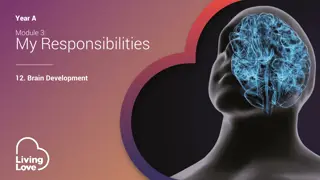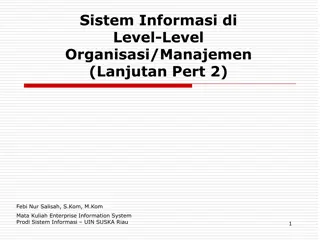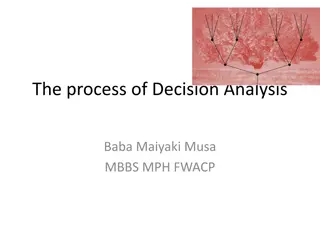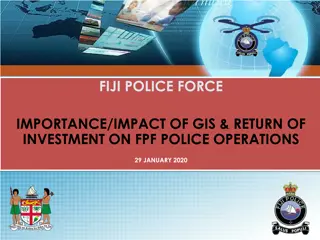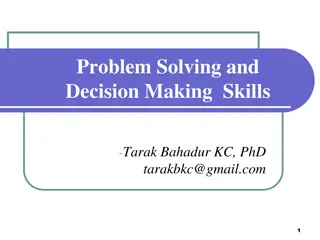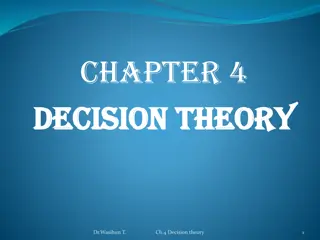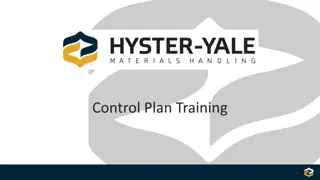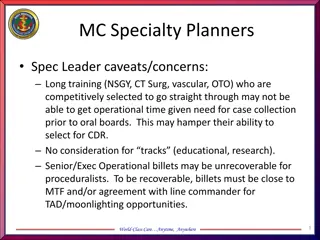Operational Control and Decision Making in CBTA Training
Operational control in Competency-Based Training and Assessment (CBTA) involves staying ahead of the wave and making fast decisions with changing risk parameters. CBTA prepares staff for problem-solving and decision-making. The training requires detailed analysis of AOC arguments, integration of safety and cost elements, and complex short-term decision-making processes. Various tools and scenarios are employed, with a focus on improving data flow and enhancing staff competence. The changing dynamics in operational control require adaptive decision-making strategies based on real-time information.
Download Presentation

Please find below an Image/Link to download the presentation.
The content on the website is provided AS IS for your information and personal use only. It may not be sold, licensed, or shared on other websites without obtaining consent from the author.If you encounter any issues during the download, it is possible that the publisher has removed the file from their server.
You are allowed to download the files provided on this website for personal or commercial use, subject to the condition that they are used lawfully. All files are the property of their respective owners.
The content on the website is provided AS IS for your information and personal use only. It may not be sold, licensed, or shared on other websites without obtaining consent from the author.
E N D
Presentation Transcript
CBTA Competency Based Training and Assessment 23 February 2025 1
Operational Control is the exercise: to stay ahead of the wave and to keep an adequate decision making speed with changing risk parameter and on basis of incomplete information CBTA shall prepare operational control staff for fast and adequate problem solving and decision making
The AOC-arguments during training need analysis Integration of all safety, operational and cost elements in one decision making process Short-term OCC decision-making will become more complex, the decision making speed becomes more important The flight planning and flight monitoring processes is integrated in a continuous risk management process More data requires higher staff competence data selection relevant for decisions The control of data flow becomes more crucial Tools for what-if scenarios and decision support will change workflows Adjustment of decision-making extent may be required Interactions between Airports, OCC and ATC (CDM) will change the rules of decision making There is no standard allocation of tasks to job titles in operational control Job titles and tasks in operational control are defined by the operator Operator will still describe specific role related competency targets Any standard intermediate qualification level in operational control would support the development of operator qualification programs Such an intermediate qualification standard could be provided internally or by more than one external supplier with potential cost advantages
ICAO: new qualification definitions and standards on basis of competency targets and realistic tasks for: Flight Operations Officer / Flight Dispatcher Air Traffic Safety Electronics Personnel Aircraft Maintenance Personnel Air Traffic Controller Pilot 23 February 2025 5
Situation Awareness Problem Solving and Decision Making Planning Control Analysis Control Improvement of Processes and Dataflow Planning Analysis
According to ICAO competence is a combination of KSA Knowledge Skills Attitude Competency Based Training and Assessment CBTA is nothing new it s a simple and clear concept 23 February 2025 7
Competency Based Training is not a new training method, it is the result of an adequate development process Competency Based Training and Assessment CBTA defines minimum standards and practices, described in ICAO Doc 10106 chapter 1 The context of FOO CBTA to other ICAO standards Reasons why CBTA covers actual and future requirements for operational control qualifications How to structure and develop a CBTA program. Description of workflows 23 February 2025 8
Competency Based Training is not a new training method, it is the result of an adequate development process ICAO Doc 10106 chapter 2 Describes the different roles and typical tasks in the context of operational control duties Describes the generic Flight Operatins Officer competency level Distinguishes between a FOO basic/license level and an advanced operator and role specific level of competence 23 February 2025 9
Competency Based Training is not a new training method, it is the result of an adequate development process ICAO Doc 10106 chapter 3 Describes a typical workflow of a training need analysis ICAO Doc 10106 chapter 4 Describes the development of a local or national competency model and a related training and assessment plan 23 February 2025 10
Competency Based Training is not a new training method, it is the result of an adequate development process ICAO Doc 10106 chapter 5 Describes a typical workflow for the development of training and assessment methods, standards, resources and materials ICAO Doc 10106 chapter 6 Describes a typical workflow for supervision, inspection and support of training and assessment 23 February 2025 11
Competency Based Training is not a new training method, it is the result of an adequate development process ICAO Doc 10106 chapter 7 Describes the training and assessment evaluation and improvement process ICAO Doc 10106 Appendix A Prerequisite Learning Objectives, Training Phase 1 ICAO Doc 10106 Appendix B Flight Operations Officer Tasks, Training Phase 2 23 February 2025 12
The risks in education and training If the wrong stakeholder defines competency targets Knowledge centered training is quite simple skills and attitude centered training is not Multiple choice question based assessments are easy for the assessor but inadequate for competence assessments Control about the training and assessment needs a strong oversight, mentoring and standardization of processes 23 February 2025 13
The stakeholder in CBTA CAA oversight and mentoring of processes and standards " Operator/AOC Training Organisation target definition on evident criteria training & assessment methods/standards" 23 February 2025 14
Competency and training need analysis 1. What are realistic tasks for the target group? 2. What are the human ressource related risks during the execution of tasks? 3. Which task related competencies shall be demonstrated during and after a training? 4. Which tasks and competencies are important in a near future? 23 February 2025 15
Competency targets for FOO, ICAO Doc 9868 Ed.3, Nov 2020, the headlines Application of Procedures and Regulations Technical Expertise Process Improvement Communication Situation Awareness Workload Management Problem Solving and Decision Making Leadership and Teamwork 23 February 2025 16
Task examples, see 10106 Appendix B for details 1. Assessment of airport suitability: weather, NAV-aids, procedures, limitations 2. Assessment of operational risks from CAMO, MRO, Crew resources 3. Post flight analysis of events and incidents 4. Identification of adequate KPI s and the method of risk evaluation 5. Description of improvements for processes, procedures, tools, competence and data flow 6. Improvement of situation awareness, problem solving and decision making processes 17
Assessment requirements Assessment shall 1. base on realistic exercises based on realistic tasks 2. include Knowledge and Skills and Attitude in one process 3. ask for consequences and context of a situation 4. process related and evident 18
Training methods and standards development, examples 1. Description of KSA-prerequisites (LO s = Learning Objectives, abstract and detailed) to prepare the exercise of tasks. See 10106 Appendix A for details 2. Development of training methods and exercises on basis of LO s and realistic tasks 3. Combination of knowledge, skills and attitude requirements for realistic assessments 4. Definition and control of instructor, material and documentation standards in a flexible CBTA system 23 February 2025 19
CBTA level in Operational Control Training Operator and role specific: Operator specific tasks Flight Dispatcher, Flight Data Maintenance, Operations Controller, Ops Engineering, 340 tasks in operational control Flight Operations Officer 3.500 detailed Learning Objectives
Qualification level 1. The aircraft operator is responsible for the definition of both, entry (FOO) and exit level (Flight Dispatcher, Operations Controller, Ops Engineer) of operator and role specific training 2. The Flight Operation Officer qualification covers general and intermediate level competencies, it simplifies and standardize the transfer to operator and role specific training 3. Operator and role specific training qualifies for the execution of operational control tasks, the FOO-level alone does not
Competence development and control FOO-training competence prerequisites should be checked, i.e basic math and physics ability to abstract and logical reasoning problem solving and decision making language proficiency communication, human factors Training progress becomes unstable and inefficient without defined and checked entry competencies
Competence development and control Strong standards in competency target oriented training and assessment allows: schedules influenced by competency-results and not so much by standard durations shortcuts for training but not for assessments an easy integration of pre-qualified students with training shortcuts
Thanks for your attention www.ifalda.org jsellhorn-timm@ifalda.org



